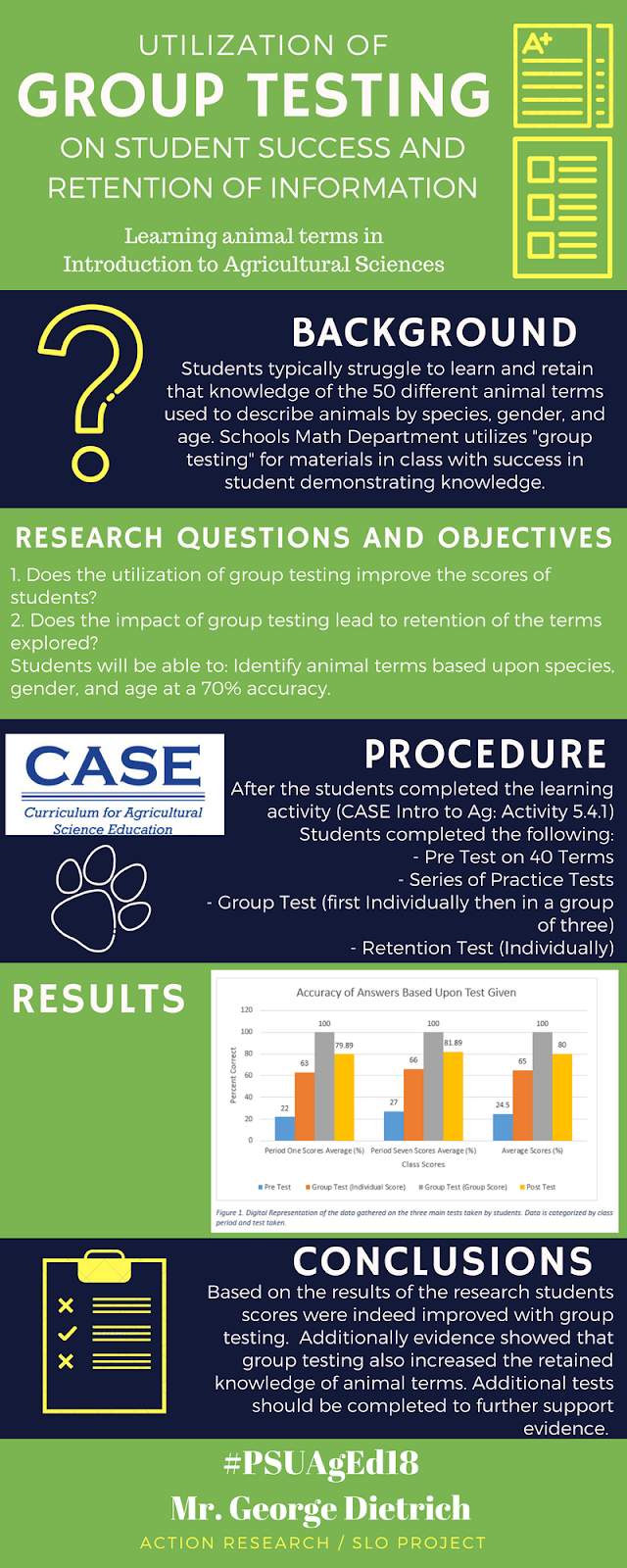Action Research Project / Student Learning Objectives - Animal Terms and Group Testing
Utilization of Group Testing for Animal Terms on Student Success and Retention of Information
Background:
Teaching
Introduction to Agricultural Science students the 50 different terms we use to
describe animals can be a challenge to best help them learn the materials. Students will see these terms and use them
again and again in other agricultural classes so the retention of these terms
are even more important. At Cumberland
Valley the Math Department utilizes a method of “group testing.” Group testing
puts students into groups of three or four to solve a series of problems as a
group. The success of learning materials
in a group for a subject such as math was explored in answering two questions:
Does the utilization of group testing improve the scores of students and does
the impact of group testing lead to retention of the terms explored.
Research Question:
- Does the utilization of group testing improve the scores of students?
- Does the impact of group testing lead to retention of the terms explored?
Literature Found:
Research has found that group testing
increases the scores on tests in comparison to taking individual testing but no
research was done on the retention of information.
Learning Outcomes:
By the end of the action research / student learning
objectives Students will be able to:
·
Identify animal terms based upon species, gender, and
age at a 70 % accuracy.
Procedure:
Students were taught the terms utilizing the
recommended procedure from Curriculum for
Agricultural Science Education: Introduction to Agricultural, Food, and Natural
Resources Activity 5.4.1 - What Am I? The following day students were given
their pre-test to see how well students remembered terms they explored
yesterday. After a series of practice
tests during the week to follow students were given their group test. Group test procedure was the following:
Students worked independently to indicate how well they individually knew the
materials. After 7 minutes students stared answers they recorded and got into
groups of three to work on finishing the questions for another 7 minutes. In 2 weeks students were given their retention
quiz where students tested independently on a total of 40 terms.
Data Gathered:
Conclusions:
Based upon the data given it is seen that a group test does
indeed increase the scores of a class as seen from a score in the 60% to a
score of 100%. Utilizing group testing
methods is a great way for students to work together on a topic that can prove
to be difficult for students to succeed on their own. Additionally the retention test showed that
students scored higher compared to their initial individual test score.
This indicates that group testing helps them clarify terms
they may have wrong. Looking at the
learning objective this method of learning has shown that students have learned
the animal terms asked of them. It is
recommended that a similar learning method is done again for the next two years
to see how well this method works as well as a possible review test in the
beginning of next school year to learn the materials there as well.
Literature:
Giuliodori,
M. J., Lujan, H. L., & DiCarlo, S. E. (January 1, 2009). Student
Interaction Characterizes During Collaborative Group Testing. Advances in
Physiology Education, 33(1), 24-29.
Pate, M.
L., & Miller, G. (November 1, 2011). Effects of Think-Aloud Pair Problem
Solving on Secondary-Level Students' Performance in Career and Technical
Education Courses. Journal of Agricultural Education, 52(1), 120-131.
Rao, S. P,
Collins, H. I., & DiCarlo, S. E. (March 1, 2002). Collaborative Testing
Enhances Student Learning. Advances in Physiology Education, 26(1), 37-41.



George, thanks for including an infographic to support your action research project! It is clear that you are familiar with designed and conducting research, and your methods were appropriate and accurate. The topic that you chose corresponded to a topic of important to not only CV, but education in general, as evidenced by your supporting literature. Great job!
ReplyDeleteGreat job working and reporting your action research project! I agree that replicating this action research each year could determine trends for group testing having a major impact on retention.
ReplyDelete